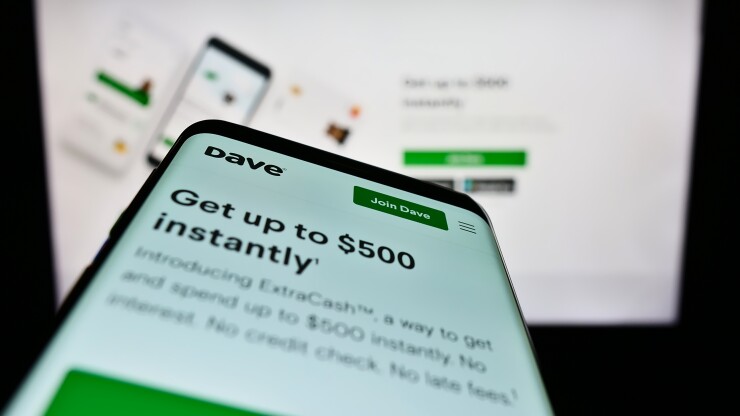
UPDATE: This article includes comments from Dave about the Justice Department's complaint as well as information from the fintech's third-quarter earnings call.
The cash-advance app maker Dave is blasting the Department of Justice for bringing a lawsuit against the company and its founder, though the fintech also says that it would soon complete its shift away from the business model at the crux of the dispute.
Dave said Tuesday in a written statement that the DOJ's lawsuit is based on "various inaccuracies" and is a "continued example of government overreach."
The Los Angeles-based company also said it would update its fee structure to eliminate optional tips and express fees for its cash advance product, "since optional tips seemed to be a primary focal point of the complaint."
The company had announced on its third-quarter earnings call that it would test the new business model, but it said this week that "based on strong initial results," it would complete "full implementation" in early 2025.
Earlier this week, the FTC said that it refers a complaint to the DOJ for civil penalties "when it has 'reason to believe' that the named defendants are violating or are about to violate the law."
The day after the DOJ filed suit, Dave said that the allegations are largely unchanged from the FTC's November complaint, and that the DOJ's additions to demand civil money penalties and name Wilk as a co-defendant are "without any support … [or] basis."
"We believe that we have always acted within the law, and we have continued to rely on the fact that other government agencies have previously reviewed the company's business model without taking action," the company said in its press release. "We take compliance and consumer transparency very seriously, and we intend to vigorously defend ourselves in this matter."
The fintech added that the DOJ must prove that there was knowledge of the alleged violation to obtain civil monetary penalties.
Dave's stock has fallen some 11% since the DOJ announced the enforcement action and was trading at $84.09 mid-morning Thursday.
Still, the fintech was one of the best market performers of 2024, notching a more than 900% rise from January to December. Dave said Tuesday that "the company's outlook remains positive," and that the firm will share a more "substantive update" during its fourth-quarter earnings call in March.
When the FTC sued Dave on Nov. 5, the company accused the agency of regulatory overreach and vowed to fight its charges.
"Following months of good faith negotiations, we are disappointed the FTC has chosen to file suit against Dave, a company on a mission to level the financial playing field for the millions of Americans poorly served by the legacy financial system," the company said in a statement at the time.
The DOJ alleged Monday that Wilk, who also serves as the company's president and chairman, reviewed many consumer complaints and internal reports about "consumer dissatisfaction arising from Dave's deceptive representations."
"The Justice Department is committed to stopping companies and their executives from preying on financially vulnerable consumers with deceptive advertisements, hidden fees and subscriptions that are difficult to cancel," said Principal Deputy Assistant Attorney General Brian Boynton, head of the Justice Department's Civil Division, in a press release.
Dave advertised to new consumers that they could easily and quickly get "up to $500," but in the first 14 months after it started pushing those messages, the company offered that amount .002% of the time, or less than once in every 45,000 instances, per the suit. A majority of the time, Dave did not offer new users any advance, the lawsuit adds.
The complaint also contends that Wilk designed a key feature that led to the lawsuit. Dave charges what it calls "tips" — a 15% cut of an advance — without making such costs clear to consumers, according to the complaint. When users accept and transfer an advance, a green "Thank you!" button that appears that, when clicked, imposes the tip.
Wilk implemented and designed the tipping function, the DOJ said.
The government also alleges that the company, with Wilk's knowledge, charged consumers undisclosed fees for them to get their advances instantly, per the company's marketing. An internal Dave presentation, cited by the DOJ, noted that "[w]hat we promised [to consumers] is not what they see," in the case of these "Express Fees."
"The presentation recommends that Dave should '[s]et expectations much earlier on the true cost of the money [consumers] are borrowing,'" the suit said. "Defendants did not adopt that recommendation."
Banking regulators hit companies with penalties for poor interest-rate risk, third-party management, anti-money-laundering controls and consumer protection, among other violations.
About a week after the FTC's original complaint in November, the company announced on its earnings call that it would switch from a "tier-based" fee structure on its cash advance product to a structure in which the company takes a mandatory percentage cut. Wilk said at the time that the switch has "several benefits," including improved clarity for investors.
"Given optional fee decline as customers season on our platform, we believe that the new fee model we are evaluating should scale better," he said. "And lastly, even though we feel strongly about the significant customer benefit that optional fees bring to consumers in need, there is no question that these fees have become more of a focus for regulators as many companies have chosen to implement this experience in various ways."
Wilk, who has served as the fintech's CEO since 2016, holds 60% of the voting power of Dave's executive stock and has a "key role" in the company's operations, content, design and marketing, per the suit.
After the FTC sued Dave in November, the company brought on Kevin Frisch as chief marketing officer to lead its strategy, including brand, content and product marketing. Frisch previously served in similar roles at Intuit, Wag and Uber.






